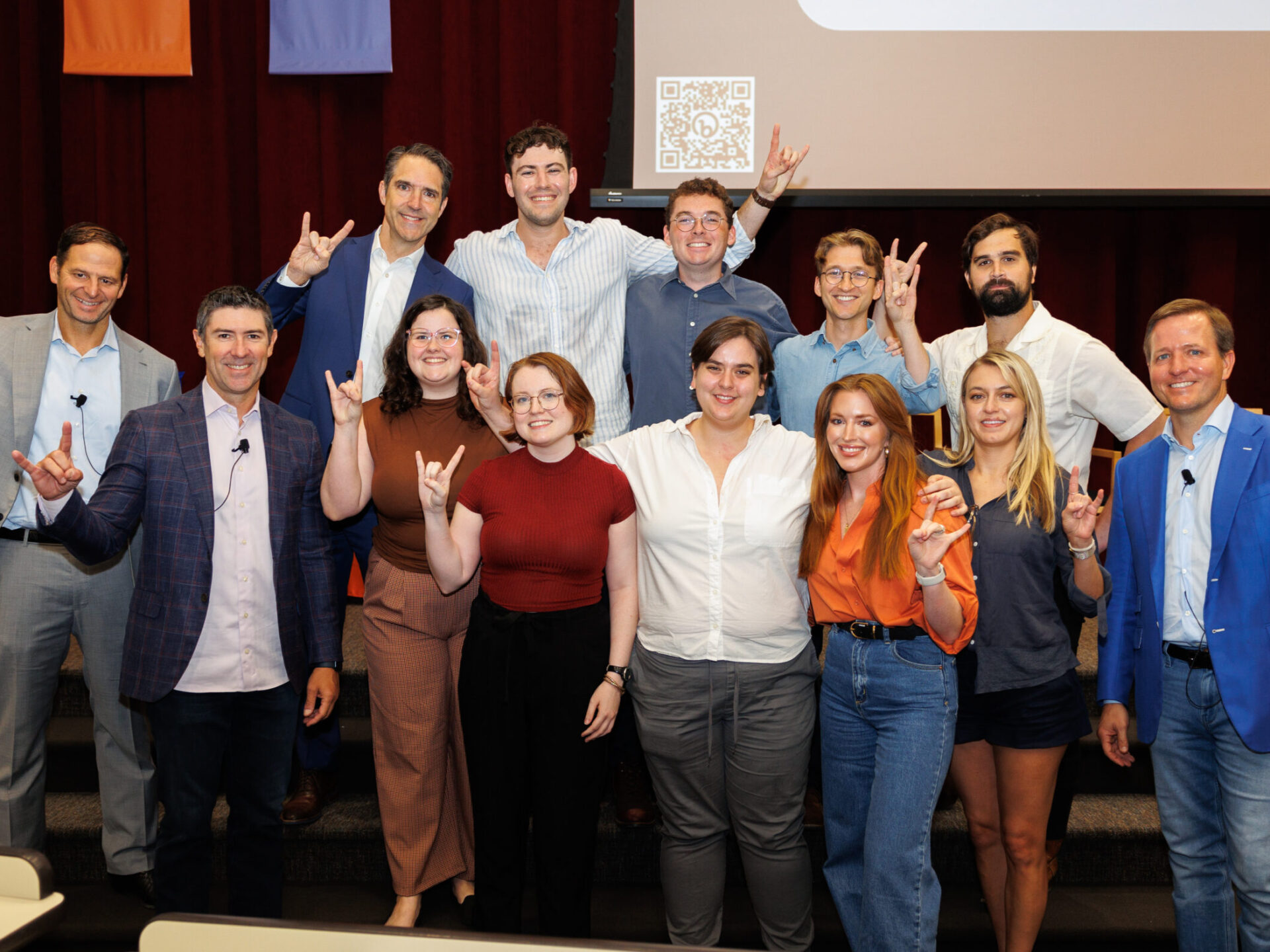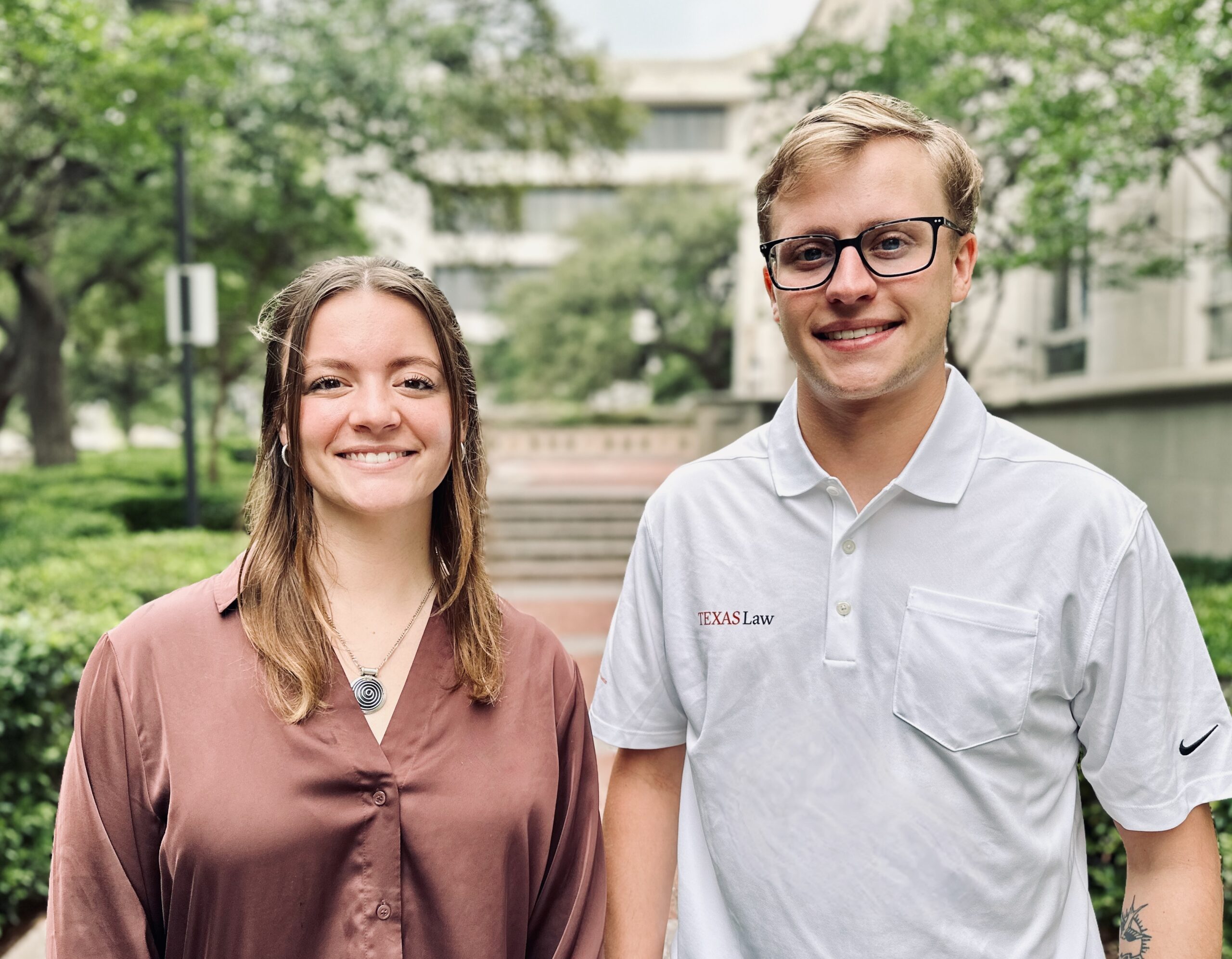
A stroll through Texas Law offers plentiful evidence of the school’s long history of plaintiff-side giants.
For starters, the school is located at 727 East Dean Keeton Street, named for the legendary former dean W. Page Keeton, who literally wrote the book on tort law, “Prosser and Keeton on Torts.” Keeton is also immortalized in a statue just outside of the school’s in-house dining establishment, George’s Café, named for George Fleming ’71, a partner at Fleming Nolen Jez.
On the northwest side of the building is one of the school’s most popular gathering spaces, the Susman Godfrey Atrium, named for legal titans Steve Susman ’65 and Lee Godfrey ’69. Upstairs from the atrium is the Jeffers Courtroom, in honor of John Leroy Jeffers Jr. ’67, once a Baker Botts senior partner who litigated the $11 billion Penzoil-Texaco case alongside perhaps the greatest plaintiffs’ attorney ever, Joe Jamail ’53.
Jamail himself is immortalized in numerous locations, including the Tarlton Law Library’s Jamail Center for Legal Research on the west end of the school complex, and the Jamail Center for Clinical Education and Justice Under Law on the east end.
Despite these deep ties to plaintiff-side lawyering, the law school has never had a student organization dedicated to those with a shared interest in the practice area. Until now.
A new student group, the Plaintiffs’ Advocacy & Litigation Society, was launched in October 2023 to connect students, alumni, and practitioners dedicated to working on behalf of plaintiffs. PALS began with a mission to educate both law students and firms, by highlighting career opportunities for students—through events, networking, and mentoring—and has now added efforts aimed at helping firms by simplifying the recruitment process and establishing Texas Law as a reliable source for talent. The organization has quickly become popular, with 75 dues-paying members and a 12-member student board.
For students envisioning their future careers, advocating for plaintiffs offers many opportunities. “You can get into court your first few months of practice, get paid well, and oftentimes represent issues that are really personal to you,” says current PALS co-president Brennan Caruthers ’25. He notes plaintiffs work may include environmental, antitrust, or data privacy law. “In large part, PALS’s founding mission was purely educational,” he says. “If we can make sure that no Texas Law student graduates without at least knowing these opportunities are out there, we’ll be happy.”
Student Education
PALS is already doing that work. “When I first arrived at Texas Law, I had no idea what plaintiff-side work even was,” says Madeline Love ’26, who was recently elected co-president of PALS for the upcoming 2024-2025 academic year. “I originally intended to pursue a separate career path and generally had very little interest in expanding my options.” Within the first few weeks of school, however, she attended a PALS event and met some of its board members.
“PALS was responsible for nearly all the education I received on what a career in plaintiff-side work was and what it might look like,” she says.

For other students, PALS shows there’s more to plaintiff-side advocacy than being a so-called “ambulance chaser.” “While I want to be clear that there’s nothing wrong with the ‘billboard lawyer,’ many students shy away from this image or tend to view all plaintiffs’ lawyers in this light,” says Jack G. Rabinowitz ’26, the other co-president-elect of PALS for the upcoming school year. “By continuing to bring in plaintiffs’ firms that break this mold, we hope to reframe how individuals, both in law school and in the broader profession, view this important work.”
Nationwide Trend
Caruthers met PALS co-president Carson Smith ’24 at a 2023 Texas Law Review symposium where they connected over shared interests. Smith had previously found the law school’s career services team to be extremely helpful. From them, he learned student interest in plaintiff-side work has waxed and waned over the years.
That interest is certainly growing now. Across the country, students at other top schools have launched similar groups in recent years, beginning with Harvard Law’s student plaintiffs’ group in 2019, according to Caruthers. As of May 2023, he says there were four U.S. law schools with plaintiffs’ law student organizations (Harvard, Stanford, Berkeley, and UC Law San Francisco) and another four (Chicago, Michigan, and Pennsylvania, as well as Texas Law) in the early stages of forming their groups.
In an exciting development, these eight student groups are collaborating. Caruthers worked with fellow students at Texas Law and these peer schools to create the National Plaintiffs’ Law Association in May 2023. NPLA aims to simplify the plaintiff-side job search process, support emerging PALS-equivalents at other law schools, and promote change within the plaintiffs’ bar. At present, 28 schools have active plaintiffs’ law associations. NPLA hosted a virtual job fair in August and shares resources, such as ideas for events that have already been hosted successfully by student groups.
Texas Law’s career services office has proudly observed PALS’s efforts. “They have mobilized and banded together with students across the country to crowdsource resources and knowledge and have created coordinated opportunities for promoting the path to a career in plaintiff’s work,” says Angélica Salinas Evans ’95, the school’s dean for career services. “We appreciate the buzz PALS has created and look forward to continuing to complement their efforts by working with all students interested in plaintiffs’ career opportunities.”
The collaboration across schools is happening in person, too. In February 2024, the American Association for Justice—the association for plaintiffs’ attorneys—held its 2024 winter convention in Austin. PALS sponsored 16 of its members to attend alongside the NPLA board, which was able to experience firsthand the many supports PALS receives from Texas Law leadership. Dean Bobby Chesney spoke at a plaintiffs’ bar cocktail reception before the conference officially began and he was an attendee at the NPLA board meeting held at Texas Law, which the PALS board also attended. Chesney took the opportunity to speak with the NPLA students about Texas Law’s commitment to student success in plaintiffs-side careers.
“We have a lead here to, as Dean Chesney put it, ‘Plant a flag in the ground and say we are going to be the best school to become a plaintiffs’ lawyer.’ The dean’s office has been so supportive since we started, and not every school is that way,” says Caruthers.
PALS Co-President Smith agrees. “When we compare notes with other students at different law schools,” he says, Texas Law has “been incredibly willing to help us get set up and provide opportunities to connect with alumni or other people who run the universe” of plaintiffs’ law.
Texas Law has “been incredibly willing to help us get set up and provide opportunities to connect with alumni or other people who run the universe” of plaintiffs’ law.
Carson Smith ’24
Alumni Support
Alumni and major firms are already showing their support. Most recently, Simon Greenstone Panatier PC in Dallas has provided scholarship funds to support four years of awards for up to five dues-paying PALS members. Meanwhile, Reid Collins & Tsai LLP in Austin, Burns Charest LLP in Dallas, Simon Greenstone Panatier, Nix Patterson LLP in Austin, and Hamilton Wingo LLP in Dallas are all donors.
Bill Reid—adjunct professor and senior founding partner of Reid Collins & Tsai—was the first practitioner who spoke to Caruthers when the student began conceiving of a Texas Law plaintiff-side student group. Reid connected Caruthers with a student from Stanford’s plaintiffs’ group, which launched the inter-school collaboration that eventually produced the NPLA. When PALS began fundraising in late summer 2023, Reid was the first sponsor and among its first speakers. Reid hosted a happy hour for PALS as well as the group’s banquet at his home. He also provided financial support to bring the NPLA board to Austin for the AAJ conference.
Additionally, PALS was awarded a foundational gift from Houston-based firm Arnold & Itkin LLP, co-founded by personal injury trial lawyers Kurt Arnold ’02 and Jason Itkin ’01. The pair has also spoken at PALS events, including “Debunking the Myth of the Ambulance Chaser,” on Aug. 31, 2023.
The two alums view their work as part of a larger mission. “Plaintiffs’ lawyers have made products safer through lawsuits and recalls. They’ve held companies accountable,” says Arnold. Among his firm’s numerous victories, Arnold & Itkin—along with co-counsel—won a record-breaking $8 billion punitive damage verdict against Johnson & Johnson and its subsidiary Janssen Pharmaceuticals, the makers of a medication called Risperdal.
Arnold and Itkin became involved with PALS to show law students they can pursue similar paths to success.
“People who went to law school to make a change—whether that’s helping those who have been catastrophically injured, the environment, or even individuals who’ve been wrongfully accused of crimes—there’s a way to do it,’” says Itkin. “As Kurt likes to always say, ‘You can still do well by doing right.’”
“It’s important to have that next generation coming up behind us,” he says of future plaintiffs’ attorneys.
Next Generation
For Smith, who will spend a year after graduation clerking for Magistrate Judge Zack Hawthorn in the Eastern District of Texas, alumni like Arnold and Itkin offer career inspiration. Smith envisions the possibility of eventually starting his own firm. “The connections I built here at Texas Law and with other students doing similar work—I know who could become partners with me,” he says.
In the meantime, he’s excited about his ongoing work with PALS.
“The best part is sitting down with students, calling attorneys, and talking to them about the existence of our board,” he says. Those conversations offer the chance to educate receptive attorneys, who wish a similar group existed when they were in law school, and students who previously didn’t know about plaintiff-side work. Both groups often ask how to get involved.
“Those are the best questions we could receive as a student organization,” Smith says.
Even after he graduates from Texas Law, Smith plans to keep providing PALS with support. “We’ve obviously had a really great reception from the school,” he says. “This has been the most fun thing I can imagine doing at law school. And I’m excited to see it grow.”
